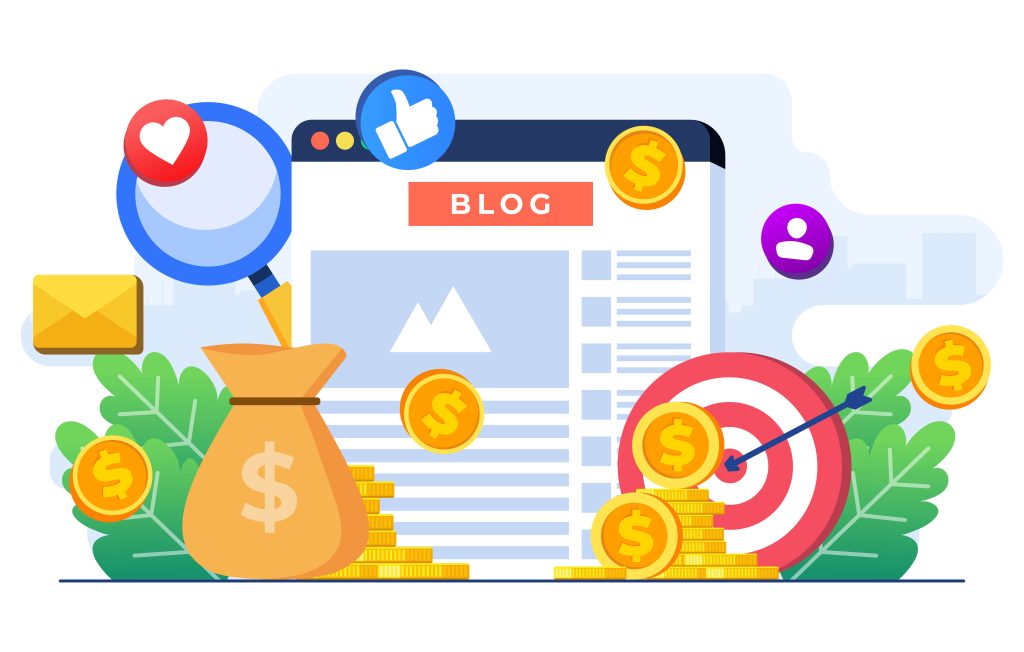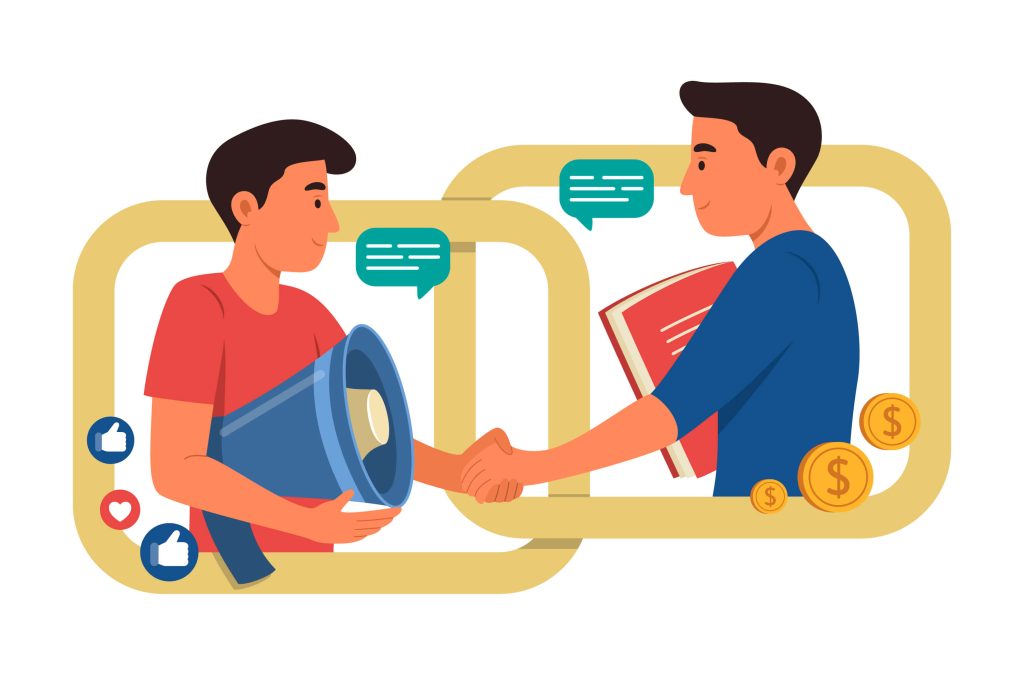According to Nielsen, 92% of consumers trust referrals from friends and family over other forms of advertising. A referral partner helps merchants gain customers through trusted recommendations. Instead of ads, businesses reward partners for driving sales, ensuring cost-effective growth.
In this article, we’ll explore what a referral partner is, the different types of them and successful cases!

What is a referral partner?
A referral partner is a business relationship where an individual or company (the partner) helps another business (the merchant or company) by referring potential customers or clients. The referral partner typically earns a commission or incentive for each sale, lead, or customer generated through their referral efforts. This type of partnership allows businesses to expand their reach and generate more leads without the complexities of traditional marketing campaigns.
Referral partners can come in many forms, from influencers, bloggers, and affiliates to loyal customers or other businesses that align with the brand’s values.
Referral partnerships are vital to business growth as they allow businesses to tap into new customer segments and expand their reach without heavy upfront investment in traditional marketing campaigns. By leveraging the influence and networks of different types of partners, businesses can generate high-quality leads, foster trust, and ultimately drive more sales.
Types of referral partners
Referral partnerships can come in various forms depending on the nature of the business and the type of audience the partner has access to. Here are some common types of referral partnerships that businesses often collaborate with:
Loyal customers

Existing customers who are highly satisfied with a product or service are often one of the most valuable types of referral partners. By offering incentives, businesses can turn loyal customers into advocates who refer others to the company. Loyal customers already understand the value of the product and can provide authentic, personal endorsements that resonate well with potential new customers.
83% of customers are willing to refer products and services, so you just need to give them incentives to share products.
Example: A SaaS company offering a referral bonus to customers who refer new subscribers to their platform.
Influencers
Influencers are individuals with a significant following on social media platforms, blogs, or YouTube. They can sway the purchasing decisions of their followers through authentic content and recommendations. Influencers typically promote products or services through posts, reviews, or shoutouts and earn commissions for sales generated from their referral links.
Example: A health and wellness influencer recommending a fitness program and linking to a sign-up page.
Affiliate marketers

Affiliate marketers are individuals or companies who actively promote products or services for a commission. They can range from professional marketers to niche bloggers who use various marketing strategies, such as SEO, paid ads, or email marketing, to generate leads and sales. Affiliate marketers typically have advanced knowledge of digital marketing techniques and can generate high-quality leads for businesses.
Example: An affiliate marketer promoting a software product through their blog, earning a commission for every user who signs up via their referral link.
Business partners and Vendors
Businesses often partner with complementary businesses to refer clients who might benefit from the other company’s services. These types of partnerships work well when there is mutual trust and a shared target audience.
Example: A website development agency partnering with a hosting service provider to refer clients who need hosting solutions.
Content creators (Bloggers/YouTubers)
Bloggers and YouTubers are content creators who review or promote products in their content. They can integrate affiliate links or promotional codes into their content, directing their audience to the business’s offerings.
Example: A blogger reviewing a piece of software and including a link for readers to purchase the product at a discount.
Examples of referral partnerships
Referral partnerships can take many shapes and can be a strategic way for businesses to reach new audiences.
The BixGrow Referral Partner App is designed to make it easy for companies to launch their own referral partner program. With BixGrow, businesses can scale their operations through strategic partnerships. With BixGrow’s user-friendly interface, signing up and starting your referral partnership program is quick and easy.
There are some referral partner program examples:
Dropbox and Its Referral Program
Dropbox, a cloud storage service, is one of the most well-known examples of a partner referral program that was integral to their early growth. The company implemented a referral program where both the referrer and the referred user received additional storage space for free.
Users could refer friends, and both would get extra space once the friend signed up. This incentive model encouraged users to promote the service actively, contributing significantly to Dropbox’s rapid user base expansion.
Dropbox offered tangible rewards (extra storage) that incentivized users to refer new customers. The program was easy to use, and the rewards were relevant to the product.
Airbnb and Hosts Referring New Hosts
Airbnb has used referral partnerships to grow its global network of hosts. In this case, existing hosts are incentivized to refer new hosts to join the platform. The referrer and the new host receive a bonus when the new host books their first guest.
Airbnb provided both financial incentives and promotional support to existing hosts, making it easier for them to refer new hosts. The company also streamlined the process by giving hosts personalized referral links.
Airbnb offered a clear, value-driven incentive (money for successful referrals), and the referral program was directly aligned with the platform’s business model. Hosts who were already satisfied with their experience on Airbnb were motivated to share it with others.
Uber and the Driver Referral Program

Uber’s driver referral program allows current drivers to refer new drivers to the platform. The referring driver received a bonus after the new driver completed a certain number of trips.
How it worked: Existing drivers would share referral codes with potential new drivers. After completing a set number of trips, the new driver would trigger the reward for both the referrer and the new driver.
Why it worked: The incentive was directly tied to the actions of the new driver, making it a performance-based referral program. The simple process and financial incentives drove large numbers of drivers to participate and refer others.
Tips to build & maintain referral partnerships
Building and maintaining strong referral partnerships is crucial for ensuring the long-term success of your program. Here are some tips on how to build referral partnerships effectively
Offer attractive incentives
Motivate your referral partners, and ensure that the rewards you offer are attractive and valuable. These incentives can be monetary, discounts, or even exclusive products/services. For example, if you’re running a SaaS business, offering your affiliates a recurring commission can keep them engaged in the long term.
50% of referral reward programs offer dollar credit to their promoters. Gift cards are the second most common referral program reward at 17.6%, followed by percent discounts (9.8%), subscription time (5.9%), cash (5.9%), and points (5.9%).
Tip: Structure tiered incentives where referral partners can earn more as they refer more customers. This encourages affiliates to go above and beyond.
Provide comprehensive marketing materials
Make it easy for your referral partners to promote your products or services, and provide them with professional marketing materials such as banners, email templates, and even pre-written social media posts. This helps maintain brand consistency and allows affiliates to get started quickly.
Tip: Regularly update the materials to reflect seasonal promotions or new product launches to keep the content fresh and engaging.
Maintain Open Communication

Building a transparent and open line of communication is essential for a thriving referral program. Regularly check in with your partners, offer feedback, and share any new updates about your products, services, or changes in the program.
Tip: Use a dedicated communication platform or CRM tool like BixGrow to track referrals, send updates, and communicate directly with your referral partners.
Track & Reward performance
Use tracking tools and platforms to monitor the success of your referral partners and reward high performers with exclusive bonuses or recognition. This not only encourages them to keep promoting your brand but also fosters a sense of accomplishment.
Tip: Consider offering additional rewards for top referrers such as early access to new features, VIP customer support, or even event invitations.
Utilize data & analytics
Measure the success of your referral partnership, it’s important to use data and analytics tools to track performance. Understanding which referral channels work best, what time of year is most effective, and the demographics of your top-performing affiliates can provide invaluable insights for scaling your program.
Tip: Leverage tools like BixGrow to track referral success and analyze which partner and referral methods are driving the most conversions. This will help you refine your strategy and offer better rewards to the right partners.
Be flexible & adapt to referral partners needs

Referral partners come in various shapes and sizes, so it’s important to be flexible with your approach. Understand their unique needs and adapt your program to support them better. This might include offering personalized incentives, adjusting payment schedules, or providing more tailored marketing resources.
Tip: Conduct surveys or have one-on-one conversations with your top affiliates to understand what they need to succeed. Implementing their feedback can help you build a more effective and supportive referral program.
By following these tips, brands can foster positive, productive relationships with their referral partners, leading to long-term growth, increased sales, and mutual success.
Who should have a referral partner program?
Referral partner programs can benefit a wide range of businesses. However, certain types of companies may see particularly strong returns from implementing such programs.
E-commerce businesses
E-commerce companies can see substantial benefits from a referral program. With the ability to offer a seamless online experience, e-commerce brands are in a prime position to leverage referral partnerships to drive traffic and sales. Referral partners can help promote products to new audiences, extending the reach of the brand.
E-commerce businesses thrive on high-volume transactions and can easily scale their affiliate or referral programs, giving them a strong incentive to create referral partnerships.
SaaS Companies

Software as a Service (SaaS) companies often rely on referrals to grow their user base. With SaaS products, partners can target other businesses or individual users who could benefit from the software. Referral partnerships can increase awareness in the crowded SaaS market while offering recurring commissions.
SaaS businesses can build long-lasting relationships with referral partners due to recurring payments from subscriptions. This creates an incentive for partners to continue driving referrals over time.
Startups & Small businesses
Startups and small businesses may not have the resources for massive marketing campaigns, but referral programs offer a cost-effective way to generate leads. By leveraging a network of influencers, affiliates, or partners, these businesses can build brand awareness and credibility without significant upfront costs.
A referral program is a low-risk, high-reward method of marketing for startups and small businesses. Partners bring in customers without the brand needing to make heavy investments in traditional advertising.
Consultants & Service Providers
If you’re a consultant, coach, or service provider, your success depends heavily on referrals. Building a strong referral network can help you gain access to potential clients through trusted recommendations. Many service providers create referral programs to incentivize their clients or partners to bring in new business.
Service providers often rely on trust and reputation. Referral partnerships help reinforce their credibility while creating an ongoing revenue stream through commissions for the referring parties.
Health & Wellness brands

Health and wellness businesses, such as supplement companies or fitness platforms, are uniquely positioned to benefit from referral programs. Affiliates can help promote products to a wide audience, including those who are actively seeking wellness solutions.
Referral partners who are trusted by their audiences, such as influencers or wellness professionals, can build long-term relationships with health-focused brands, leading to a steady stream of new customers.
In summary, any business that has products or services with the potential for mass appeal and an online presence can benefit from a referral partner program. Whether you’re an established business or a new startup, referral partnerships help build brand credibility, expand customer reach, and drive sales – all while fostering positive relationships with partners.
Wrap it up
Referral partner programs are a powerful tool for businesses looking to expand their reach, build trust with new audiences, and boost sales. By leveraging a network of partners who share your brand’s values and goals, you can foster strong relationships that not only generate leads but also create long-term growth opportunities. Whether you’re a small business, an e-commerce brand, a SaaS company, or a service provider, implementing a referral partner program can significantly impact your success.
To build and maintain a successful program, it’s essential to choose the right partners, offer competitive incentives, and ensure clear communication throughout the partnership. Tools like BixGrow can help streamline your referral program, providing you with the resources to manage and grow your network efficiently.
If you haven’t already, it might be time to start thinking about implementing a referral partner program to accelerate your growth and success in today’s competitive landscape.